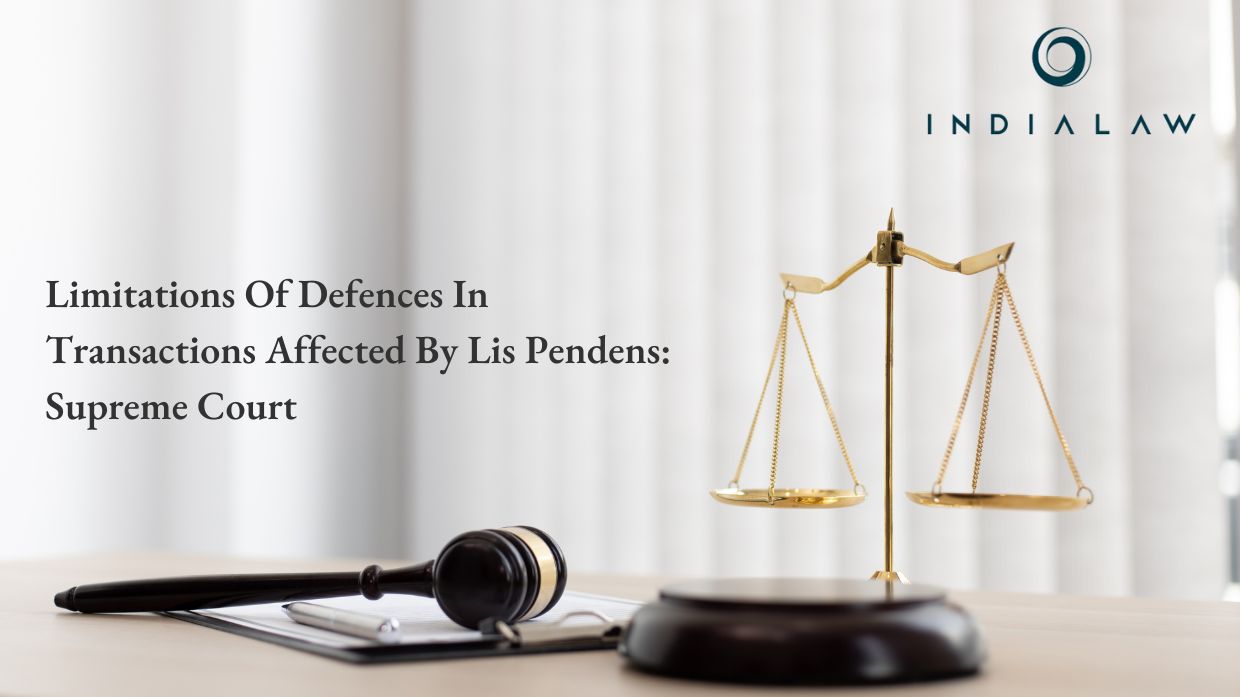Limitations Of Defences In Transactions Affected By Lis Pendens: Supreme Court

The Hon’ble Supreme Court (“SC”) in its latest judgement[i] reiterated that once the transaction is affected by the doctrine of Lis Penden, then the defence of being a bona fide purchaser and lack of notice regarding the sale agreement are not available.
Table of Contents
Facts in Brief:
The Plaintiff instituted the suit on 24th December, 1992 claiming specific performance of the Agreement to Sell dated 17th August, 1990, entered into with the Defendant No.1, in respect of the suit land against the payment of earnest money of Rs. 40,000/- (Rupees Forty Thousand Only) and the balance amount of Rs. 7,54,000/- (Rupees Seven Lakh Fifty Four Thousand Only) at the time of execution and registration of the sale deed on or before 30th November, 1992.
According to the Plaintiff, he remained present in the office of the Sub-Registrar on 30th November, 1992 with the balance sale consideration and all the expenses for stamp papers, however, the Defendant No. 1 did not turn up to perform his part of the agreement. Therefore, the said Suit for specific performance was filed by the Plaintiff. During the pendency of the suit, the Appellant / Defendant No. 2 was impleaded on 25th January, 1993 on the basis that the Defendant No. 1 executed a registered sale deed in his favour on 8th January, 1993 in respect of the suit land on the basis of alleged agreement to sell dated 19th November, 1990 for a sum of Rs. 6,45,937.50/- (Rupees Six Lakh Forty Five Thousand Nine Hundred Thirty Seven and Fifty Paisa Only).
It was the case of the Defendant No. 2 that the agreement, basis which the suit is filed, is a fabricated antedated document because the Defendant No. 1 did not disclose the factum of this agreement while executing the sale deed in his favour and thus, the Appellant / Defendant No. 2 is a bona fide purchaser.
Findings of Trial Court:
The Ld. Trial Court vide its judgment dated 27th April, 2007 held that the Plaintiff has proved the Agreement to Sell, wherein the Defendant No. 2 has failed to prove that the agreement is a result of fraud and fabricated document. However, the Ld. Trial Court denied the decree for specific performance on the ground that since the Defendant No. 2 is the owner in possession of the suit land upon execution of the Sale Deed dated 8th January, 1993. Therefore, the Defendant No. 1 is left with no right or title of the suit land. The Ld. Trial Court also held that the Plaintiff was ready and willing to perform his part of the contract. It was also held that the Defendant No. 2 is a bona fide purchaser as he was not having any knowledge about the Agreement to Sell between the Plaintiff and the Defendant No. 1.
Findings of First Appellate Court:
The First Appellate Court maintained the Ld. Trial Court’s judgment and decree by holding that the subject sale agreement is a result of fraud and collusion between the
Plaintiff and Defendant No. 1.
Findings of High Court:
The Hon’ble High Court (“HC”), opined that the sale deed executed by the Defendant No. 1 in favour of the Defendant No. 2 / Appellant is hit by doctrine of Lis Pendens and that the Defendant No. 2 / Appellant is not a bona fide purchaser. The HC noted that the suit was filed on 24th December, 1992 and the next date before the Ld. Trial Court was fixed on 12th January, 1993. However, the sale deed was executed by the Defendant No. 1 in favour of the Defendant No. 2 on 8th January, 1993. Both the Defendant Nos. 1 and 2 being the residents of same village, it is unbelievable that the Defendant No. 2 was not having the knowledge of the Agreement for Sale Deed in favour of the Defendant No. 2 was for a lesser amount than the Subject Agreement. The agreement was for a sale consideration of Rs.7,94,000/- (Rupees Seven Lakh Ninety Four Thousand Only) whereas the Sale Deed was for Rs.6,45,937.50. (Rupees Six Lakh Forty Five Thousand Nine Hundred Thirty Seven Thousand and Fifty Paisa Only). Further, it is also held that mere relationship between the Plaintiff and the Defendant No. 1 would not be a ground to deny the discretionary relief and moreover, when both the courts below have found that the Plaintiff was always ready and willing to perform his part of the contract.
Analysis of Hon’ble Supreme Court:
The SC opined that the Ld. Trial Court had partly decreed the suit to the extent of recovery of Rs. 40,000/- (Rupees Forty Thousand Only). This part of the decree was not challenged by the Defendants either by filing a separate appeal or by way of cross objections. They did not prefer any cross objection challenging the finding on issue. In this situation the Defendants have conceded to the decree for refund. Therefore, in absence of cross-appeal or cross-objections by the Defendants, the First Appellate Court could not have recorded a finding that the subject agreement was a result of collusion between the Plaintiff and the Defendant No. 1.
The SC then recited its various precedents and said that in a recent judgment of this Court in Chander Bhan (D) through Lr. Sher Singh vs. Mukhtiar Singh and Ors[ii]., it was observed,
“…once it has been held that the transactions executed by the respondents are illegal due to the doctrine of Lis Pendens the defence of the respondents 1 – 2 that they are bona fide purchasers for valuable consideration and thus, entitled to protection under Section 41 of the Transfer of Property Act, 1882 is liable to be rejected.”
Since, it was an admitted position that the suit was filed on 24th December, 1992 and the sale deed was executed on 8th January, 1993 by the Defendant No. 1 in favour of the Defendant No. 2 / Appellant during pendency of the suit. The doctrine of Lis Pendens as contained in Section 52 of the Transfer of Property Act, 1882 applies to a transaction during pendency of the suit. The Ld. Trial Court found execution of agreement to be proved and directed for refund of the amount of Rs. 40,000/- (Rupees Forty Thousand Only) by the Defendant No. 1 to the Plaintiff/Appellant with further finding on issue no. 5 that the agreement was not a result of fraud and collusion. The Defendant did not prefer any cross-appeal or cross objections against the said partial decree and allowed the finding to become final. The Plaintiff was non-suited only on the ground that the Defendant No. 2 had no notice of the agreement and is a bona fide purchaser. However, once sale agreement is proved and the subsequent sale was during pendency of the suit hit by the doctrine of Lis Pendens, the HC was fully justified in setting aside the judgment and decree of the Ld. Trial Court and the First Appellate Court and passing a decree for specific performance.
Author’s opinion:
The Author is of the opinion that the doctrine of Lis Pendens helps in protecting the rights of the affected party by putting others to notice that a litigation is pending against a property or land, which can affect the potential buyer’s ownership rights. This doctrine has acts as deterring people from purchasing a property from seller against whom a suit is pending and further potentially reducing complexities in acquisition of property or land.
[i] Shingara Singh v. Daljit Singh and Anr. Civil Appeal No.5919 of 2023.
[ii] 204 INSC 377.
By entering the email address you agree to our Privacy Policy.



